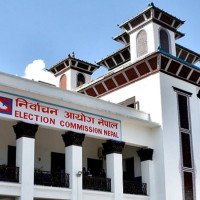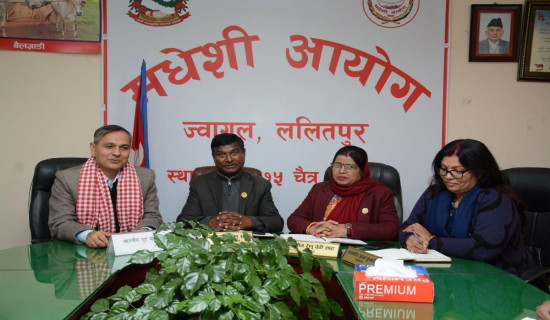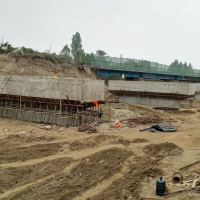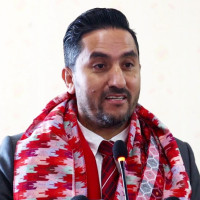- Thursday, 8 January 2026
Nepal will be among world's top ranking nations for conducting elections: CEC Thapaliya
The elections to the House of Representatives (HoR) and Provincial Assemblies are now two weeks away. The twin elections are due on November 20. The EC has expedited the final preparations to hold the election in a free and fair manner. It has already completed the printing of ballot papers and transporting election materials in the respective polling stations and centres. In this context, Arpana Adhikari of The Rising Nepal talked to Chief Election Commissioner, Dinesh Kumar Thapaliya. Excerpts:
What stage has the preparations for the upcoming federal and provincial elections reached now?
On behalf of the Commission, I would like to express my heartfelt gratitude to Gorkhapatra Corporation and its publications for their support in creating a favourable environment for holding the elections to House of Representatives (HoR) and Provincial Assemblies (PA) in a free, fair and fearless manner. We are nearing the final stage of preparations. The commission has completed its preparations of managing voter lists, managing polling stations, polling centres, election materials and budget management. We are now focused on manpower management, transporting election materials that have reached the office of returning officers to the polling stations and centres and preparing to go to the election in a fearless environment. The commission is focused on providing training to avoid any errors and weaknesses.
Political parties and candidates have already started electioneering, how have the security arrangements been made?
The security of political parties, candidates, election staff and voters is a matter of concern during the election. So, we have to prepare a security plan accordingly. A separate security plan has been prepared considering the ground reality of the local level and its current security situation. Similarly, a security plan has been prepared after assessing the security situation of each constituency and analysing the security challenges. In the same way, we have made district level, state level and central level security plans in an integrated manner.
Similarly, every political party and candidate must inform us about their programme, including mass meetings, 24 hours in advance. This arrangement has been made to avoid possible clashes between two groups. Not just visible security, we have looked at all the aspects of security in a subtle manner and have prepared a security plan accordingly. Necessary arrangements have been arranged so that everyone can feel safe and secure.
Some political parties have made public their decision to boycott the election, how has the commission viewed this?
This is a political issue. The commission wants everyone to take part in the election. But in democracy, there is also the right not to participate in the election. Therefore, if they had made any calls or activities in a peaceful manner by remaining within the framework of the constitution and law, it would not be considered too objectionable according to democratic values. We request all not to do anything that tramples on the people’s right to vote in periodic elections. So, we request all to participate in this election campaign despite minor differences.
EC has sought clarifications from candidates, what will be its implementation? Is it just an explanation or has the commission moved forward in the implementation phase as well?
If anyone dares to break the moral and legal bonds, the EC shall first seek clarification from the alleged violator, followed by an investigation that may result in punishment if proven guilty. For the implementation of election code of conduct this time, arrangements have been made so that the monitoring officers, election officer and chief returning officers of all 77 districts can also ask for an explanation and proceed with the action. But only the Commission can make the final decision. We will make sure that the violators face the music.
The EC is alleged of trying to curb freedom of expression guaranteed by the constitution. What do you want to say about this?
For the first time, the commission has made a policy on how to use social media in elections and the issue of regulating social media is included in the code of conduct. Even so, we have moved forward with the concept of the press office, in order to regulate even the spread of mis-information and hateful expressions that can be spread through social media. Even though this concept has been questioned earlier, it has become irrelevant. Mis-information, dis-information and hate speech should not be mixed with the freedom of expression guaranteed by democracy, election and constitution.
“Mis-information, dis-information and hate speech should not be linked with the freedom of expression guaranteed by democracy, election and constitution.”
That is evil. We believe that if we mix character assassination with the freedom of expression, it will erode democracy. It is not the matter of our concern if anyone says 'No Not Again', 'No Never Again', 'Elect Again' or 'Elect Again and Again'. The only thing the commission believes is that it should be said in a civilised language and should not assassinate anyone’s character. If doing so means suppressing freedom of expression and democratic values, the commission is ready to face criticism and punishment.
It is said that the EC has become stricter this time. Is it within the framework of the constitution?
The EC is not strict. Looking at the situation in all areas, a political culture is being established in the country. Political parties have also realised that they must follow the election code of conduct as well as election law. If the number of road accidents drops, it doesn’t mean that the traffic police have become stricter; it means that drivers and passengers have become aware of traffic rules. That said, some credit can be given to traffic police. Now put the EC in the place of traffic police. It may get some credit, but lion’s share of the credit goes to voters, political parties, civil society, media, and concerned stakeholders.
The number of women candidates for the first-past-the-post (FPTP) electoral system is a meagre 8.86 per cent. Your views on this?
Analysing the overall picture of the candidacy of direct election, it can be said it is neither inclusive nor women-friendly. It is clear that the political parties have not considered the rights ensured by Article 38 (4) of the Constitution seriously and have ignored the idea of the Constitution that all state organs will be formed on the basis of the principle of proportional inclusion. But no matter what the situation is in a direct election, the Constitution has guaranteed at least one-third women lawmakers in the HoR and PA. The Commission will take necessary steps to make the law that ensures this happens.
Despite filing a formal application with the EC regarding her eligibility to run and the status of her position in another body, a women candidate received no answer and was allowed to register as a candidate from Lalitpur. But later, the Commission annulled her candidacy in a decision that has since been reversed by an interim order of the Supreme Court. Would you like to say something about the matter?
The Election Commission cannot issue anyone with a certificate of eligibility in advance. Even after someone has filed their candidacy, the Commission itself cannot question their qualification.
Another candidate, however, can and the Commission is the authority to then make the final decision.
In Dr. Toshima Karki’s case, the EC made its decision after a complaint was filed against her candidacy. The decision was based on existing laws and on the orders given by the apex court in similar cases during the local elections held earlier this year.
But since we have again encountered this issue of candidacy and the holding of public positions, the Commission will go to court to get an interpretation of the issue that will prevent such disputes from arising in the future.
What are EC’s preparations to improve voters’ education and to reduce invalid votes?
In the local poll, the ballot paper was complicated with many election symbols on it. The EC was even compelled to put the election symbol of those parties with no candidates.
The voters’ education also couldn’t reach the community level.
The number of invalid votes was high. Two of these three reasons have already been resolved.
Regarding voters’ education, the campaign already kicked off at the community-level recently. Under the campaign, campaigners are reaching voters’ doorstep to educate them. This time sample polling is going on at all local levels.
We will reach the community to address issues raised in the last local poll and in the case of mobile users, we are using both social media and mass media to educate them.
The Supreme Court has already directed the government to ensure voters’ right to reject all candidates in election. Does the commission think of addressing this legally?
The commission has moved forward focusing on five or six issues on how the next election should be. It has been in preparations to ensure the voting rights of Nepalis living abroad in the next periodic election.
For this, the EC will start the process of registering the voters’ name in the voters’ list from their country of residence.
The provision of rights to reject and right to recall will be incorporated in the law. Similarly, inclusive participation of the women, minorities and persons with disabilities will be ensured in the candidacy filing for direct electoral system and also in head and deputy head of the local level. In the days ahead, the system of collecting the voter list through the local government should be implemented legally. Similarly, at least two ballot papers will be used in local elections. Necessary arrangements will be made to count the votes of the chief and deputy chiefs at the counting centre and votes of ward chair and members within the ward itself.
A fixed date will be written in the law for the compulsory periodic elections. The concept of an autonomous and empowered commission will be implemented by enacting new law. It will propose a new law incorporating all these provisions.
What are the EC’s preparations for the upcoming presidential and vice-presidential elections?
The final results of November 20’s elections will be announced and the report submitted by December 8. After this, a new session of the parliament will be convened. And as soon as the new members of parliament take their oath of office, the commission will get voters for the presidential and vice-presidential elections.
EC was ranked one of the top 10 commissions globally for its work in holding the 2017 general elections. Is there any basis to believe it will achieve the same recognition this time around?
The first premise is that we have addressed almost all the issues raised by the international community in our context. The eligibility age varies from country to country. And there is an international practice that the people who reach the defined age on a day before the election date will be eligible to cast a vote. Nepal has also adopted this principle from this election. Secondly, the commission has followed the standards, laws and code of conducts to ensure fairness of the election. Thirdly, representatives of various countries and organisations have been called to supervise the elections, with over 40 national and international organisations coming for the task. To enhance the fairness, some 10,000 observers – including election commissioners from South Asian countries – will submit their observation reports after the election.
There is an international practice of making transportation as easy as possible on election day. But in Nepal, vehicular movement is restricted. We are trying to sort this problem out so that votes can be cast in a conducive environment.
I think Nepal will now rise to 5th or 6th position from 10 for holding the best elections.
“I think Nepal will now rise to 5th or 6th positions for holding the best elections.”
The election manifestos of political parties contain lofty promises, many of which are unattainable. Doesn’t this violate election code?
The manifestos also include the issues that are not specified by the constitution, like the concept of directly elected president and prime minister, fully proportional electoral system and unitary system. The Commission has no right to raise questions on such matters. It is up to the voters to evaluate such issues whether they are implementable or not.
There are complaints about the election becoming too expensive. Your opinions about this?
There are three aspects of the electoral system that make it expensive. First is the EC’s own expenditure; the second is the expenditure on election security and the third is the expenses of political parties and candidates. Analysing all these aspects, this election will be less expensive compared to the previous ones.
What measures the commission has adopted to make this election friendly to the disabled, women and elderly?
The Commission has incorporated this provision in its procedures and guidelines to ensure the disabled, women and senior citizens are able to vote comfortably and have a place to rest. We have also informed the voting officers about these guidelines. This time, we have set up 100 model disabled-friendly polling stations.
This problem can easily be solved if the polling officers, employees and security personnel show a little sensitivity.















